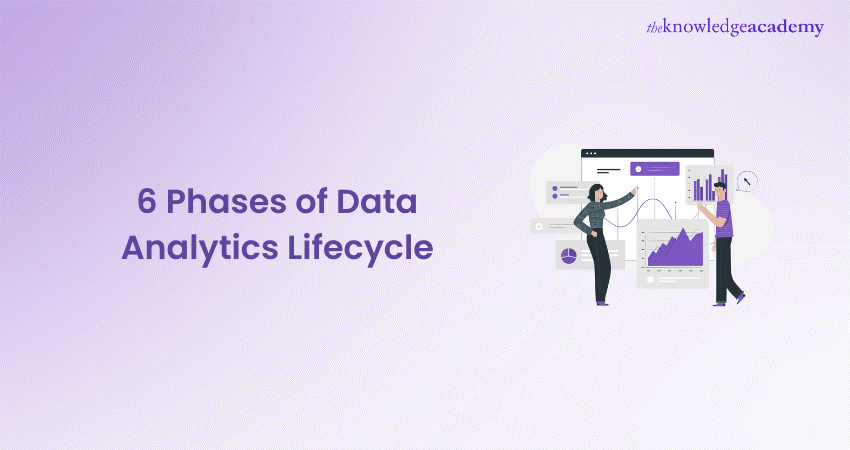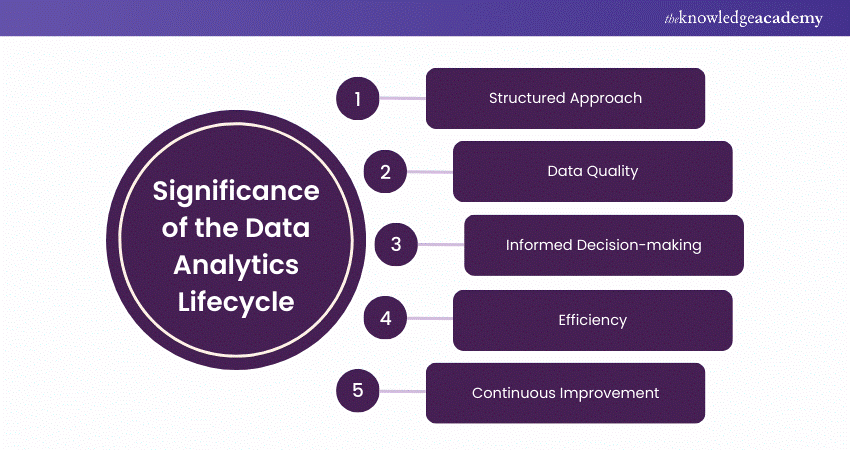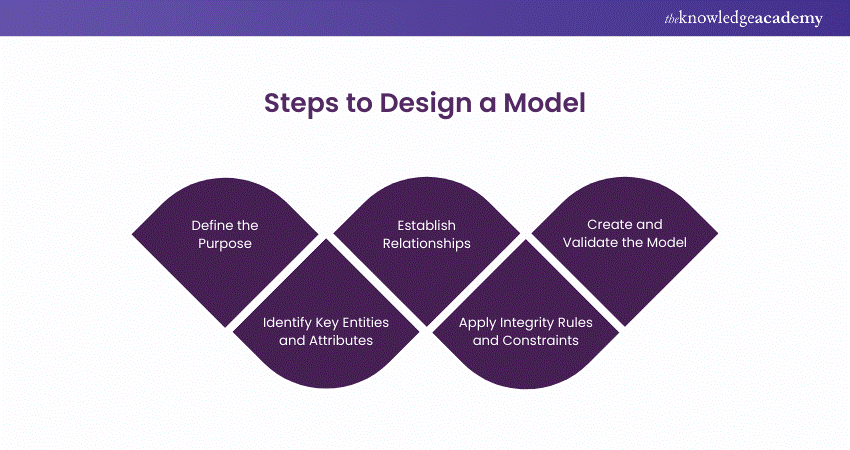We may not have the course you’re looking for. If you enquire or give us a call on +44 1344 203 999 and speak to our training experts, we may still be able to help with your training requirements.
Training Outcomes Within Your Budget!
We ensure quality, budget-alignment, and timely delivery by our expert instructors.

Have you ever wondered how businesses transform raw data into actionable insights? The Data Analytics Lifecycle provides a structured approach to this transformation, ensuring that each step is methodically executed for optimal results. From identifying objectives to final reporting, each phase is essential in the entire procedure. But ever wondered why is it important to follow a structured lifecycle? Because it ensures consistency, accuracy, and efficiency in Data Analysis.
In this extensive blog, we will talk about the six fundamental phases of the Data Analytics Lifecycle, shedding light on how each stage contributes to solving complex business problems. Read more to unlock the secrets of successful Data Analytics.
Table of Contents
1) What is Data Analytics Lifecycle?
2) Why is the Data Analytics Lifecycle Important?
3) Phases of Data Analytics Lifecycle
a) Data Discovery and Formation
b) Data Preparation and Processing
c) Design a Model
d) Model Building
e) Result Communication and Publication
f) Measuring Effectiveness
4) Conclusion
What is Data Analytics Lifecycle?
The Data Analytics lifecycle comprises six essential phases, each critical for businesses engaged in Data Analytics. This lifecycle is based on the widely adopted Cross-Industry Standard Process for Data Mining (CRISP-DM) model, an open-standard analytics framework developed by IBM. The phases include defining business objectives, cleaning data, building models, and communicating with stakeholders.
This process begins with identifying the problem to be solved, followed by testing models on sandboxed data and ultimately deploying these models on a production dataset. This approach helps uncover answers to initial questions and informs strategic business decisions.
Why is the Data Analytics Lifecycle Important?
The Data Analytics Lifecycle is crucial for several reasons. Let's explore five key points, highlighting its importance:

a) It gives a systematic framework for managing and analysing data, ensuring that each step, from data collection to interpretation, is methodically executed.
b) By emphasising data cleaning and preprocessing, the lifecycle helps maintain high data quality, which is essential for accurate and reliable analysis.
c) The lifecycle transforms raw data into valuable insights, enabling organisations to make decisions that drive business success.
d) Following a defined lifecycle streamlines the Data Analysis process, reducing redundancy and improving efficiency in handling data projects.
e) The lifecycle includes stages for monitoring and maintenance, allowing organisations to continuously evaluate and improve their data strategies.
Lead the Data Revolution with our Big Data Architecture Training – join us and build the future!
Phases of Data Analytics Lifecycle
This scientific method is used to create a structured framework for the Data Analytics Lifecycle, which involves six stages. This framework is both direct and cyclical, meaning all big Data Analytics processes must be completed sequentially but can also be revisited in any order. Below are the six fundamental phases of the Data Analytics Lifecycle:
1) Data Discovery and Formation
This is the first and most critical step. Here, you identify your data objectives and determine how to achieve them through the Data Analytics Lifecycle. Initial evaluations and assessments help develop a hypothesis to solve business issues. Data is evaluated for its potential uses, origins, intended messages, and benefits to the business.
2) Data Preparation and Processing
This phase involves gathering, sorting, processing, and purifying collected information to ensure it is ready for analysis. Ensuring all necessary information is accessible is crucial before moving forward.
3) Design a Model
After defining your business goals and gathering data (formatted, unformatted, or semi-formatted), you create a model to achieve these goals. This stage involves planning how to use the data effectively.

By identifying key variables and relationships, you can structure your model to provide actionable insights. Regularly refining and validating the model ensures it remains accurate and relevant.
4) Model Building
In this phase, datasets are created for testing, training, and production. Data Analytics professionals develop and operate the model using tools and methods such as decision trees, regression techniques, and neural networks. They run trial tests to ensure the model matches the datasets and determine if the current tools are sufficient or if a more robust system is needed.
5) Result Communication and Publication
This process begins with collaborating with key stakeholders to evaluate the project’s outcomes. The project team identifies major conclusions, calculates the business value of the results, and creates a narrative to communicate findings to stakeholders.
Stay ahead of the curve with our Data Science Analytics Course – join us now and unlock your potential!
6) Measuring Effectiveness
The final stage involves providing stakeholders with a comprehensive report, including results, coding, briefings, and technical documents. The data is moved from a sandbox to a live environment to assess if the results meet the business objectives. If the findings align with the goals, the reports are finalised. If not, the cycle can be revisited to adjust inputs and achieve the desired outcome.
Conclusion
We hope our blog has helped you unlock the secrets of the Data Analytics Lifecycle. By mastering its six phases, you can transform raw data into powerful insights besides driving innovative solutions. Start your data journey and make every byte count.
Elevate your skills with our comprehensive Data Analytics With R Course – register today and unlock the power of R!
Frequently Asked Questions

The Three C's of Data Analytics are Clean, Curate, and Communicate. Cleaning ensures data accuracy, curation organises data meaningfully, and communication involves presenting insights effectively.

The three most common Data Analysis types are Descriptive, Predictive, and Prescriptive. Descriptive analysis summarises data, predictive analysis forecasts future trends, and prescriptive analysis suggests actionable steps.

The Knowledge Academy takes global learning to new heights, offering over 30,000 online courses across 490+ locations in 220 countries. This expansive reach ensures accessibility and convenience for learners worldwide.
Alongside our diverse Online Course Catalogue, encompassing 17 major categories, we go the extra mile by providing a plethora of free educational Online Resources like News updates, Blogs, videos, webinars, and interview questions. Tailoring learning experiences further, professionals can maximise value with customisable Course Bundles of TKA.

The Knowledge Academy’s Knowledge Pass, a prepaid voucher, adds another layer of flexibility, allowing course bookings over a 12-month period. Join us on a journey where education knows no bounds.

The Knowledge Academy offers various Big Data and Analytics Trainings, including the Big Data Analysis Course, Couchbase Training, and Data Science Analytics Course. These courses cater to different skill levels, providing comprehensive insights into Data Mart vs Data Warehouse.
Our Data, Analytics & Artificial Intelligence (AI) Blogs cover a range of topics related to Data Analytics offering valuable resources, best practices, and industry insights. Whether you are a beginner or looking to advance your Data, Analytics & AI skills, The Knowledge Academy's diverse courses and informative blogs have got you covered.
Upcoming Data, Analytics & AI Resources Batches & Dates
Date
 Hadoop Big Data Certification
Hadoop Big Data Certification
Thu 23rd Jan 2025
Thu 20th Mar 2025
Thu 22nd May 2025
Thu 17th Jul 2025
Thu 18th Sep 2025
Thu 20th Nov 2025







 Top Rated Course
Top Rated Course



 If you wish to make any changes to your course, please
If you wish to make any changes to your course, please


